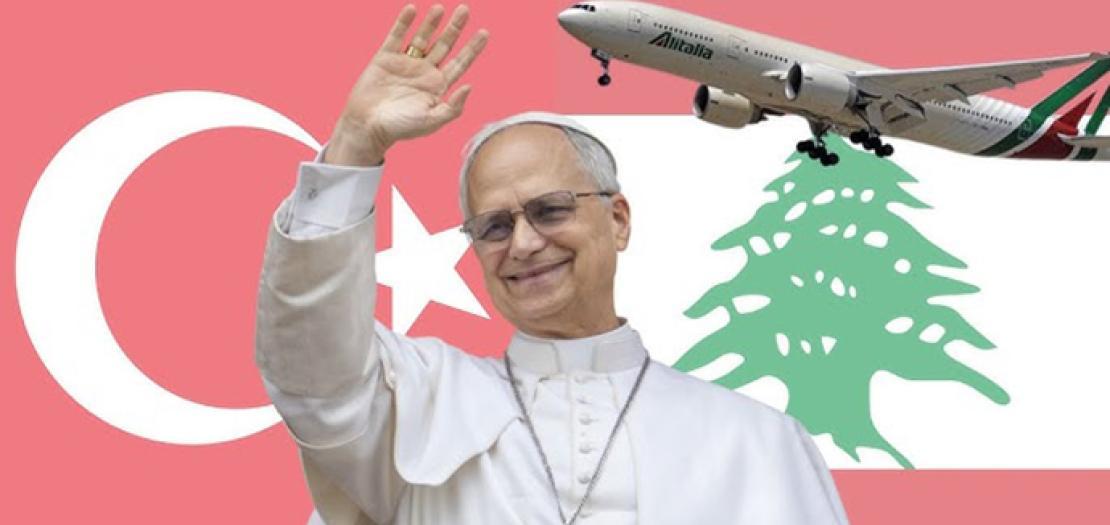Issued by the Catholic Center for Studies and Media - Jordan. Editor-in-chief Fr. Rif'at Bader - موقع أبونا abouna.org
That is why the Pope will visit Turkey and Lebanon
The Holy See has announced that Pope Leo XIV, who was elected on May 8, will begin his first apostolic trips with two highly significant destinations at the ecumenical and the geopolitical levels, namely Turkey and Lebanon following receiving official invitations from the civil and religious authorities in both countries. On November 27, his plane will touch down in Istanbul Airport, marking his first trip outside Italy since his election as Pontiff.
Why Turkey? Turkey nowadays gains a strong foothold on both the international political and economic arenas, yet its selection by the Pope to be the first leg of his trip holds a profound symbolic and spiritual dimension. This is due to the fact that it fulfills the dream and plan of Pope Francis, who visited Turkey in 2014 and later intended to commemorate the 1,700th anniversary of the Council of Nicaea, namely the first ecumenical council in the history of the Church which brought together between 250 and 318 bishops at the invitation of Emperor Constantine in 325AD. This council played an axial role in unifying the nascent Christian faith at the time, as it witnessed the formulation of “the Nicene Creed”, which bears the name of the city that hosted it. Consequently, the Pope's personal presence on this historic occasion asserts his continued quest for Christian unity among the various Churches, institutions, and ecclesiastical traditions.
The "Papal Pilgrimage to Iznik" (the ancient city of Nicaea) also constitutes a support for the declining Christian presence in Turkey and for deepening ecumenical dialogue, particularly with the Orthodox Church, whereby along with the ecumenical patriarch and representatives of various Churches, the Pope will celebrate the Feast of St. Andrew on November 30. St. Andrew is the spiritual father of the Byzantine Church, while his brother, St. Peter, is considered the head of the Catholic Church, with each pope being referred to as "the successor of St. Peter."
This visit will undoubtedly support Islamic-Christian dialogue in Turkey, while extending this to the entire world. The schedule of the trip may include a visit to the Blue Mosque as his predecessors did, namely John Paul II, Benedict XVI, and Francis.
Why Lebanon? The second leg of his trip will be a state visit to fraternal Lebanon, a country plagued by economic, political, and social crises. This has been a long-awaited visit, and it was also a dream for Pope Francis that never came true due to the complex circumstances facing the dear Land of the Cedars.
Lebanon is considered a basic component of Christianity in the East, and the Pope's visit will be, as he had said in press statements, "a new opportunity to proclaim a message of peace and hope in the Middle East, in a country that has suffered greatly." In 1997, Pope John Paul II visited Lebanon and signed its relevant Apostolic Exhortation, describing it as "more than a country, it is rather a message." Pope Benedict XVI visited Lebanon in 2012 and signed the Apostolic Exhortation relevant to the Church in the Middle East.
From this premise, Lebanon will be Pope Leo's first destination in the East designed to enhance the Christian presence, to develop dialogue among Churches, and to consolidate dialogue between Christians and Muslims, as well as among different civilizations. It will undoubtedly be his first meeting with the patriarchs of the East in an Arab country. Lebanese journalist Ricardo Karam wrote: "Let us open our hearts to welcome this blessed visit, may it restore to us the confidence and hope we have lost, and brighten up our path toward a future worthy of the Lebanon that we love."
In conclusion, we plead with the Almighty God to have the situation in Gaza and Palestine settled, so as to be the next destination of his apostolic trips, as four popes have so far visited the Holy Land with their first leg being to dear Jordan.







